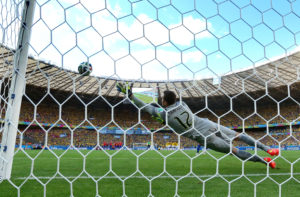By CHRISTOPHER GUMINA
NEW YORK – Monday, April 19th, 2021, is a date that will go down in soccer history. This was the day that saw the announcement of a new European Super League, which would be the largest reordering of European soccer since the 1950s. There will be at least two more standard seasons before the inaugural season of this league occurs, and obviously a lot can change in that time. There will be legal challenges to overcome, but even if the league were to fail for some reason the fans would not soon forget that their teams ignored them in favor of a financial windfall.

Twelve clubs – AC Milan, Arsenal, Atlético Madrid, Chelsea, Barcelona, Inter Milan, Juventus, Liverpool, Manchester City, Manchester United, Real Madrid, and Tottenham – were announced as founding members of the new Super League. These 12 teams are expected to be joined by an additional three, bringing the total to 15. According to Fabrizio Romano, the Woj or Adam Schefter equivalent in soccer, the remaining three teams could be Bayern Munich, RB Leipzig, and Porto, although nothing is yet decided.
This would leave the league without French representation, calling into question its status as a “European” Super League. Paris Saint-Germain would be the most obvious team to fill this gap. It is somewhat surprising that they were not involved in this project from the beginning, as they have become the most obvious example of new owners taking over a team and spending seemingly limitless money with little regard for the fans themselves. However, their president, Nasser al-Khelaifi, sits on the UEFA board and leads beIN Media Group, which has paid significant sums of money to broadcast Champions League games, and obviously has the incentive to keep the top teams in that competition.
The format of the league would be far more similar to the NFL/NBA/MLB than the current domestic soccer leagues. Each year there would be 20 clubs in the league – the 15 founders along with an additional five teams. The 15 founders cannot be relegated from the league, meaning that only the 5 additional clubs would change year to year. It is unclear at this point how these would be chosen. The Super League website calls them “annual qualifiers” but does not give specifics. Obviously the domestic leagues would not allow any of their teams to join the Super League for a season then come back and reclaim their spot.
The 20 teams would be split into two groups of 10, who would play home and away games throughout the year. At the end of this group stage, the top 8 teams would progress to a knockout tournament, which would eventually yield one winner.
The clubs themselves can (and will) attempt to justify the creation of the league by claiming that it will increase the quality of the product on the field, pitting the best teams against each other on a weekly basis. However, there is one obvious factor guiding this decision: money.
The 15 founding clubs will receive an upfront payment of €3.5 billion ($4.19 billion US) that will be divided equally. The entire venture is to be bankrolled by J.P. Morgan, who will distribute $6 billion in loans to the teams.
The announcement has been met with near universal disgust from the soccer community. It has been panned by casual fans on Twitter (“Disgraceful,” “Money,” “RIP Football,” and “Greedy” were all trending throughout the day) and pundits alike, with former Manchetser United star player Gary Neville saying, “I’m disgusted, absolutely disgusted. I’m disgusted with Manchester United and Liverpool the most. Liverpool say they’re the people’s club, ‘You’ll Never Walk Alone,’ the fans’ club. Manchester United, 100 years, born from workers around here, and they’re breaking into a league without competition. That they can’t be relegated from. It’s a disgrace.”
This announcement seems even more distasteful coming on the heels of a year marked by tragedy and uncertainty, one in which communities pulled even closer together around their soccer clubs. Arsenal stand out, given that they laid off 55 employees in the midst of the pandemic while simultaneously discussing a new Super League with an initial €3.5 billion bonus.
FIFA, UEFA, and the domestic leagues are also universally against the Super League. FIFA had previously stated that any players who play in a breakaway league would be banned from the 2022 World Cup. Given that nearly all of the best players in the world feature for the 12 teams already included (Messi, Ronaldo, De Bruyne, Pogba, Suarez, etc.) this would dramatically reduce the quality of the World Cup. One also cannot help but think about how the players themselves feel about the unknown scenarios which can play out.
For many playing in and winning the World Cup is a dream. Will they be comfortable losing the ability to compete for their country in order to line the pockets of their domestic team’s owners?
FIFA is not the only organization that has the power to bar players and teams, however. UEFA released a statement that read:
“UEFA, the English Football Association and the Premier League, the Royal Spanish Football Federation (RFEF) and LaLiga, and the Italian Football Federation (FIGC) and Lega Serie A have learned that a few English, Spanish and Italian clubs may be planning to announce their creation of a closed, so-called Super League.
“If this were to happen, we wish to reiterate that we – UEFA, the English FA, RFEF, FIGC, the Premier League, LaLiga, Lega Serie A, but also FIFA and all our member associations – will remain united in our efforts to stop this cynical project, a project that is founded on the self-interest of a few clubs at a time when society needs solidarity more than ever.”
